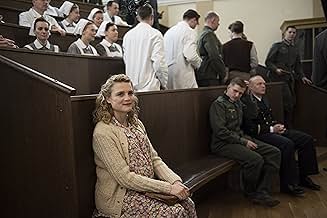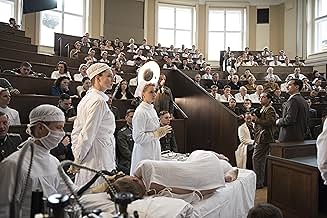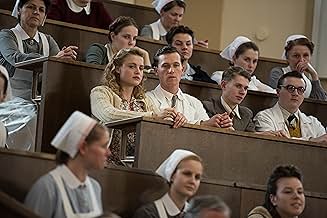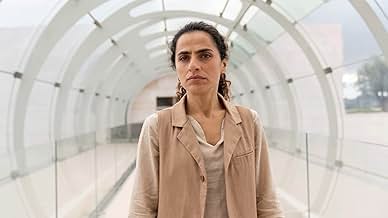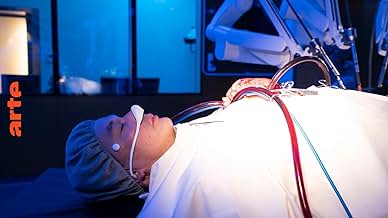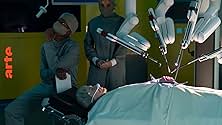IMDb-BEWERTUNG
7,8/10
3985
IHRE BEWERTUNG
Die Errungenschaften der bekanntesten deutschen Ärzte und Wissenschaftler des renommierten Charité-Krankenhauses in Berlin während seiner Geschichte.Die Errungenschaften der bekanntesten deutschen Ärzte und Wissenschaftler des renommierten Charité-Krankenhauses in Berlin während seiner Geschichte.Die Errungenschaften der bekanntesten deutschen Ärzte und Wissenschaftler des renommierten Charité-Krankenhauses in Berlin während seiner Geschichte.
- Auszeichnungen
- 3 Gewinne & 9 Nominierungen insgesamt
Folgen durchsuchen
Empfohlene Bewertungen
Overall, good television. There are a few points that an American audience may find cloying, but I had no problem with it. It may be too "soapy" with the romantic entanglements woven into the story. I could have done without the melodrama-- less of it anyway-- but it has to be taken into consideration this is a "continental European" drama. In many ways, this can be attributed to the timeframe of the story. Late nineteenth century European society was more heavily church dominated in that era. So, what seems like quaint, outdated and even eyerolling concerns that weigh so heavily in this story can come off as silly, in that period these were issues that strongly impacted daily life. While these subplots may seem overly dusty to most viewers, it certainly is historically appropriate. There is also the fact that this was produced with a German audience first and foremost. As I've seen in other recent German productions (Babylon Berlin; Our Fathers, Our Mothers --aka "Generation War" outside of Germany) , the romantic subplots aren't presented in quite the same fashion as they are on this side of the Atlantic. As for myself, I find it a refreshing shift in presentation.
Production, writing and performance are all high standard. Well above what is typical German television. While it might not grab a huge audience in the U.S. because of its subtle but still distinctly different style in telling a story, I strongly encourage folks to give it a try.
Production, writing and performance are all high standard. Well above what is typical German television. While it might not grab a huge audience in the U.S. because of its subtle but still distinctly different style in telling a story, I strongly encourage folks to give it a try.
Moving, thoughtful and thought provoking. While these events were unfolding in Berlin I was in London and, briefly, a patient in the blacked out and lightly blitzed Children's Hospital, Great Ormand St. Only people of my advanced age , British as well as German, will fully understand what they are seeing. However all the youngsters can enjoy the intelligent script and fine acting.
8B24
On first viewing the promos for this series, I was determined not to watch it, fearing that...like so many German films in recent past...it would be filled with sensationalist and graphic wartime atrocities. When at the urging of a colleague I did give it a chance, I was pleasantly rewarded by its technical brilliance and occasional emotional depth. The medical scenes are nowhere as good as those of British or American hospital soaps, but they are in any case subordinate to a riveting drama framed by actual historical data from World War 2. The main characters are in fact based on real people, and the events more or less accurately in harmony with contemporary events.
As usual, subtitles are inferior to dubbing. Simultaneous verbal and visual effects are needed to avoid losing a great deal of dramatic impact. Many subtle or ironic phrases in German go flying right past translation, especially in a rapid fire interchange like many in this story.
Another minor fault is that, as in many fictional accounts of the war, too many small gratuitous references and characters from history keep popping up to impede the main narrative. But that in no way diminishes the central theme of ordinary people, non-combatants, coping with the traumatic impact of atrocities occurring all around them.
Are there other lessons to be learned from witnessing a sympathetic and righteous population taken over by a cult leader in challenging times? I think so.
Very well made and great character studies. There were some inaccuracies such as the setting started out in the Autumn of 1943 and and there is a discussion about heading to Africa to be with Rommel. The North African campaign was lost by the Germans and over by the Spring of that year.
Many medical issues and procedures seem correct for its time, but the one doctor was doing mouth to mouth on a baby and that procedure did not come into practice until the 1950s. Perhaps that was to show the doctor was imaginative and non-conformist.
An event where the doctors were treating a hemo-pneumo thorax showed the doctors first interested in removing the metal in the chest, when in fact the priority is on relieving intrathoracic pressure via a chest tube or needle decompression and then stopping bleeding and then vascular and tissue repair. Getting the bullet out is something Hollywood has been hung up on from the beginning. The doctor though, does explain why he wants to look for the metal and remove it, perhaps to appease those that would question it, but the priority was off.
Anyway, the show is a must for those interested in history and/or medical shows.
A great WW II movie from an angle I never thought about before. I enjoyed the entire series but it was difficult watching the parts where the little kids were in their beds or being transferred. Something to think about on this hot summer day.
Wusstest du schon
- WissenswertesSeason 3 takes place in Berlin, summer 1961.
- VerbindungenReferenced in Riverboat - Die MDR-Talkshow aus Leipzig: Folge vom 15. Februar 2019 (2019)
Top-Auswahl
Melde dich zum Bewerten an und greife auf die Watchlist für personalisierte Empfehlungen zu.
- How many seasons does Charité have?Powered by Alexa
Details
Zu dieser Seite beitragen
Bearbeitung vorschlagen oder fehlenden Inhalt hinzufügen


![Trailer Staffel 2 [OV] ansehen](https://m.media-amazon.com/images/M/MV5BNWU0YWE0YjMtNDZjYy00ODk3LWE1NWItMjkwOTE0NTA5MDA4XkEyXkFqcGdeQXRyYW5zY29kZS13b3JrZmxvdw@@._V1_QL75_UX500_CR0)
